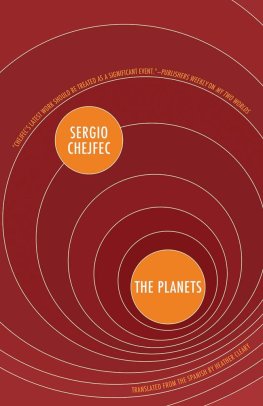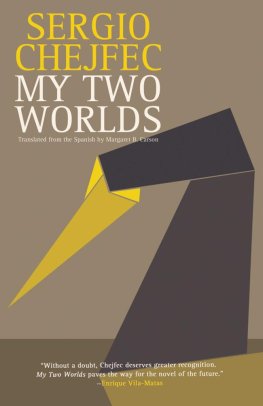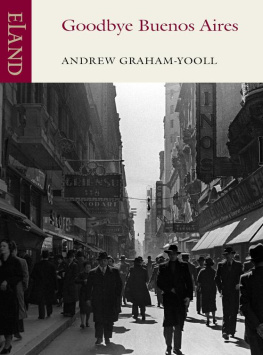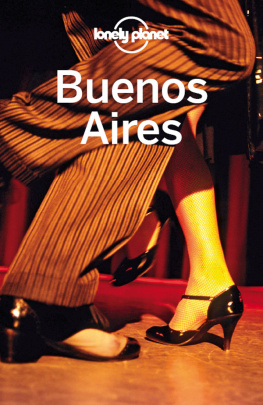Sergio Chejfec - The Planets
Here you can read online Sergio Chejfec - The Planets full text of the book (entire story) in english for free. Download pdf and epub, get meaning, cover and reviews about this ebook. year: 2012, publisher: Open Letter Books, genre: Prose. Description of the work, (preface) as well as reviews are available. Best literature library LitArk.com created for fans of good reading and offers a wide selection of genres:
Romance novel
Science fiction
Adventure
Detective
Science
History
Home and family
Prose
Art
Politics
Computer
Non-fiction
Religion
Business
Children
Humor
Choose a favorite category and find really read worthwhile books. Enjoy immersion in the world of imagination, feel the emotions of the characters or learn something new for yourself, make an fascinating discovery.
- Book:The Planets
- Author:
- Publisher:Open Letter Books
- Genre:
- Year:2012
- Rating:4 / 5
- Favourites:Add to favourites
- Your mark:
- 80
- 1
- 2
- 3
- 4
- 5
The Planets: summary, description and annotation
We offer to read an annotation, description, summary or preface (depends on what the author of the book "The Planets" wrote himself). If you haven't found the necessary information about the book — write in the comments, we will try to find it.
Sergio Chejfec: author's other books
Who wrote The Planets? Find out the surname, the name of the author of the book and a list of all author's works by series.
The Planets — read online for free the complete book (whole text) full work
Below is the text of the book, divided by pages. System saving the place of the last page read, allows you to conveniently read the book "The Planets" online for free, without having to search again every time where you left off. Put a bookmark, and you can go to the page where you finished reading at any time.
Font size:
Interval:
Bookmark:
Sergio Chejfec
The Planets
For Graciela Montaldo
Of all invisible countries
the present is the most vast
ONE
Dream, nightmare, truth. To Grino, the series played itself out like a promise rather than a dream. Days earlier he had woken to a memory, at the time still unreal: Selas little legs, which suggested a future beauty and inspired a desire inappropriate for her age, ruined by her fall. But dreams were insatiable, they always demanded more; according to Grino it was not enough just to dream them, they also sought some other form, a complementary action to rescue them from the confusion of the night. It is not only the dream, then, that took on a new inflection; real incidents in this case, Selas fall were cast in a nocturnal light, revealing an enigmatic quality. It would be in keeping with the order of things for a ripe piece of fruit to fall to the ground under the force of its own weight, but the fact that the girl should tumble from the tree after he dreamt about her fall transposed the whole sequence of events, including the backdrop against which they took place, onto the realm of the fantastic: the causes outnumbered the effects. Grino often wondered about the power of his dreams: whether they simply reflected events or if, perhaps, they catalyzed them. A patio, a few flower pots, a fig tree, and typical tile flooring completed the scene; the bedrooms were off to the side, set back about three meters, and one meter further, half hidden by branches and cans containing the sprouts of future plants, a railing separated the patio itself from the area used for the clotheslines, the laundry room. Little by little, Grino had become accustomed to the details of this scene, in which the girl was only one element; he had decided to call her Sela as soon as he laid eyes on her on his first day of work. Sela could reach the top of the tree in just a few movements, but she climbed slowly, stretching her legs so wide that Grino was afraid that at any moment her delicate body might be torn apart. After a while, she would disappear into the dense foliage, only to reappear further up, perched on a swaying branch. She would sit there for hours, like a sentry. The scene reminded Grino of a photo of a girls swim team lined up along the edge of an indoor pool, their heads covered by their swim caps and their legs exposed, poised to kick off a government-sponsored competition with their first dive. He had seen these images in magazines as a young boy, had thought about them until they began to feel like part of him: pictures of a row of bodies against a murky, dark background in which one might imagine people, but where there might only have been bleachers, or perhaps nothing at all. Since the water, too, was invisible, the swimmers appeared to be performing some sort of ritual, their joined hands pointing downwards as though invoking a submerged deity. The caption of the photo read The girls are grateful for their healthy development. Watching Sela climb the tree, Grino would think: She climbs like a swimmer. Her legs reminded him of the bodies of the girls in the picture, but were endowed with all the darkness, danger, and urgency that the others, due to his youth and the nature of photography, had lacked.
Something happens and the scene is transformed. The explosion is right on time. One can imagine the din of shattered stones, broken branches, the shifting of the earth that ends only when, paradoxically, it becomes clear that nothing is as it had been. Changes in nature often seem impermanent; they might be violent, even cataclysmic, but their effects spill out quickly as they fold themselves into the landscape and soon all is quiet again, which means it is time to begin anew. Nonetheless, years ago, when the news reported an explosion out in the countryside, beyond the city limits, I sensed that some aspect of those changes not a before or an after, but a who, a how, and a how much would prove to be more intractable, though less perceptible, than the changes in the landscape.
It was an impassive plain, interchangeable: there is infinite countryside just like it. Only in the minds of its inhabitants and in the memory of the animals and that great expanse of dirt, stones, plants, water, and little else did the blast hover like a noise waiting to trail off. Few things seem more gratuitous than setting off an explosion in the middle of nowhere, but in this case the macabre disguised itself as meaningless or innocent, a banality, supplanting the true face of terror. (This turned the danger into something irrational, not because it was too much to comprehend, but because it made itself known by unfolding according to an unfamiliar order.) The article talked about remains scattered over a vast area. There is a word that describes it well: sprayed. Appendages sprayed, spread out in concentric circles from an unequivocal center, the site of the explosion. No matter which direction one went, one would run into remains for hundreds of meters, remnants that had become no more than mute symbols fit only for an epilogue: bodies broken after having suffered, been torn to pieces and dispersed.
I looked up from the newspaper and toward the street. A taxi slowed, affectedly, neither coming to a stop nor advancing. I tried to formulate a thought: This is how we go through time, I said to myself, just barely moving forward. Aside from the lessons that could be culled from it, the taxis sluggish pace was meant, primarily, to give its passenger a moment. The man was eventually ready to pay, and the driver turned completely around to accept his fare in a gesture that seemed, if not overly obliging, at the very least contrived. Certain insights could be drawn from this, too, I thought. What I mean is that life proliferated itself through these events, while the text of the newspaper was something static, something that speaks of a seemingly inevitable past, a realm in which hope is extinguished, et cetera. While life and time marched forward in unison, branching out into infinite possibilities and consequences, the news stories that effaced the past and left us without hope were like a cynical grimace announcing what was to come, for example, that what once was light was about to fall into darkness.
Like many others, probably, I believed that I knew things the newspaper did not mention. In my case, the explosion had a painful history, which began with the abduction of M (M for Miguel, or Mauricio; it could also be M for Daniel since, as we know, any name at all can reside behind letters). Several days passed between the abduction and its announcement, a length of time I do not dare try to calculate, partly because I am not sure that I could: those days were not days at all they were a single, interminable mass of time, at once ephemeral and able to reproduce itself without end; in a cruel twist of fate, as they sometimes say, the pages of that newspaper offered the only possibility of an ending, if not in the form of a conclusion then at least as a cessation, a way of giving shape to that mass and thereby opening it up to an after.
I should say that I lacked then, as I do now, any proof that M was in that explosion. But I was not, I am not, in a position to ignore the possibility. Imagining him among the dead served little purpose; in fact, it served no purpose at all. Nevertheless, it was a thought that insinuated itself time and again through association: what once pulsed with life, its own form of abundance, that is, his body, a combination of liquids, nerves or whatever all of that could be called (a typical presence to which the world has grown accustomed and is widely taken for granted, the habit of leaving life unspoken); the thought of something that had been inexhaustibly alive until that moment, the organic life of a body now emptied of its substance, took the shape of an idea marked by necessity, perhaps even by fate.
Font size:
Interval:
Bookmark:
Similar books «The Planets»
Look at similar books to The Planets. We have selected literature similar in name and meaning in the hope of providing readers with more options to find new, interesting, not yet read works.
Discussion, reviews of the book The Planets and just readers' own opinions. Leave your comments, write what you think about the work, its meaning or the main characters. Specify what exactly you liked and what you didn't like, and why you think so.













